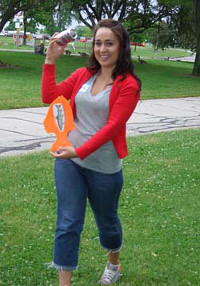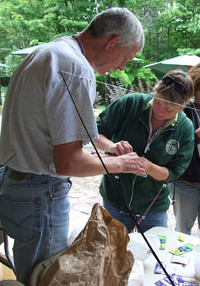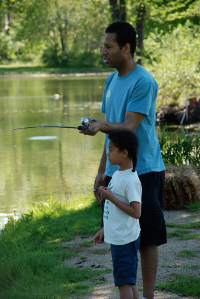Angler and aquatic education
Be a part of Wisconsin's conservation tradition by becoming an Angler Education Instructor.
The angler education program is looking for people who enjoy working with novice anglers of all ages, like to fish or would like to learn by helping to teach others.
Instructors provide opportunities to learn basic fishing skills, explore Wisconsin's aquatic resources, and develop a set of conservation ethics to help ensure that Wisconsin's lakes and streams remain bountiful for future generations.
The program provides training workshops to clubs, schools, youth development organizations and service groups. Trained instructors have access to educational resources and loaner fishing equipment.
If you want to become an Angler Education instructor, please get in touch with the Angler Education Office. Watch the workshop schedule below for opportunities to get certified.
Instructor Certification
Who are the instructors?
Instructors are people like you. Youth leaders, classroom teachers, fishing club members and civic leaders are encouraged to attend a workshop as a team or form one at the workshop. Successful program models include after-school fishing clubs, summer enrichment classes, family-school/camp adventures, scout merit badges and more.
While this program has traditionally focused on youth, remember to consider adults who may have missed the boat as kids.
Certification Process
People get certified as Angler Education Instructors by attending a training workshop and completing a background check using DNR Form 4100-217 [PDF].
Here are more specifics on the certification process.
Training Workshops
Angler education instructor certification workshop
Basic Angler Education instructor certification workshops focus on teaching spin casting and incorporating related topics in a K-12 curriculum, youth development program or adult education. Some workshops feature fly fishing or complementary aquatic resources education programs.
Fishing club members, youth leaders, classroom teachers, community center staff and civic leaders are encouraged to attend as a team or form a team at the workshop. Successful models include after-school fishing clubs, summer enrichment classes, school-family events and Boy Scout merit badge training.
General Workshop Information
The following information applies to all training workshops. A list of upcoming workshops is at the end of this page.
Audience
Workshops are geared toward adults who would like to teach others to fish. Space is limited to 20 to 30 people, depending on size of venue.
Background Checks
Successfully passing a background check is part of the certification process. It is helpful to have this completed before the workshop. Please submit DNR Form 4100-217 [PDF] to us. If you have difficulty with the form, we can help! Contact the Angler Education Office.
Workshop Fee & Cancellations
Free! Unless otherwise noted, these workshops are free. However, they come at a cost to a small budget to provide them. If you sign up and cannot attend, please get in touch with us by the cancellation deadline so that we can offer your spot to someone on the waiting list and adjust food quantities. Thank you for your consideration.
Anglers fund these workshops through the Federal Sport Fish Restoration fund. A small percentage of that apportionment supports Angler Education and other Angler R3 (recruitment, retention and reactivation) programs.
Dietary Notes
We will feed you! People with food allergies or other dietary restrictions should be advised that while we will attempt to accommodate special dietary needs, we cannot guarantee that no cross-contamination will occur. This information will be collected during the registration process.
Workshop Format
Workshops will be held in-person unless otherwise noted.
Upcoming Workshops - 2025
We do not currently have any training workshops scheduled. Registration information will be posted when available.
Tackle Loaner Program
No fishing rod? No problem. You can borrow fishing equipment at several DNR offices, state parks, and facilities. There is no charge to borrow the equipment – enjoy your day fishing in Wisconsin and return the equipment in the condition in which you received it (or better) so that the next person can enjoy it.
Check out the fishing equipment contacts page for information on who to contact to find exactly what gear is available near you. If you have general questions about the Tackle Loaner Program, contact the Angler Education Office.
Available gear
While special lures and fresh bait are not provided, we generally have the following basic equipment at most sites:
- Spincasting rods and reels - these reels are push-button style with a closed face, are a good choice for young beginners and are the most common type of gear available.
- Spinning rods and reels - these reels have an open bail and allow for greater casting distance.
- Casting plugs.
- Bobbers.
- Hooks, lines and sinkers.
In addition to fishing equipment, some sites (but not all) have fish printing materials, knot-tying practice equipment, Backyard Bass (a casting game) and other educational resources like Fish Packs [PDF]. Fish Packs are stocked with games, stories and activities that help youngsters learn about Wisconsin fish. Check one out or download the link for ideas to create your own. When you contact or visit a loaner site, inquire about their offer.
Keep in mind
Before you plan a fishing trip around loaner equipment, know that:
- Equipment is available on a first-come, first-served basis.
- You may borrow equipment for up to one week unless your area has low demand. Ask the contact in your area if an extension is possible.
Follow the Golden Rule
Please return the loaner equipment in the condition you would like it to be when you borrow it.
- Make proper handling and care of equipment part of your angler or fishing education program.
- If the equipment was damaged, return all the parts with a note explaining what happened.
- Instructions to fix a tangled reel [PDF].
The most popular time for borrowing the equipment is also the busiest time for our field staff - spring and early summer. Please help them by returning the equipment clean and in good working order. If something breaks -- which sometimes happens -- fix it if you can, or bring the problem to our staff's attention so the next group will have functional equipment. Your help with maintenance frees up our field staff for stocking fish, working on habitat projects, keeping our parks in tip-top shape and providing visitor services.
Adopt a fishing tackle loaner site
Many tackle loaner sites would welcome help with equipment maintenance. This would be a great volunteer service project for scouts, students, fishing clubs or anyone who'd like to pitch in and ensure that our gear is in shape for beginner anglers. Materials will be provided for re-spooling and general clean-up. Loaner sites that want help are marked with a VM. Locate the site nearest you on the fishing equipment contacts page and call them to find out how you can help. Thank you!
Clinics
Search for Fishing on our events calendar for clinic locations. We'll add them as we learn of them.
Don't forget about the Free Fishing Weekend, the first weekend in June and the third weekend in January - no license is required. Mark your calendars now to plan your next Free Fishing Weekend outing for your organization or friends and family:
- Free Fishing Weekend - Summer, June 7 & 8, 2025
- Free Fishing Weekend - Winter, Jan. 17 & 18, 2026
- Free Fishing Weekend - Summer, June 6 & 7, 2026
¿Habla usted español?
Necesitamos pescadores que hablen español para patrocinar o ayudar en nuestras clínicas de pesca. Estos eventos enseñan a pescar a gente de todas edades.
Por favor déjenos saber que usted habla español si usted va ofrecer una clínica de pesca, o si va ayudar como voluntario, e incluiremos un aviso que “se habla español” en el anuncio de estos eventos en nuestro sitio web.
Koj puas paub hais lus hmoob?
Peb xav yuav neeg uas paub hais lub hmoob los qhuas qhia neeg txhua lub noob nyoog txog nuv ntses. Yog nej muaj lus xav qhuas qhias thiab txawj hais lub hmoob, thov nej qhia rau peb paub. Yog nej xav tuaj pab thiab paub lub hmoob, thov nej qhia rau peb thiab. Peb mam li tshaj tawm rau ntawm peb lub Web site kom txhua tus hnov tias muaj neeg uas paub hais lus hmoob tuaj qhia txog nuv ntses.
Travel Wisconsin lists special events and opportunities on its website:
Fishing [exit DNR].
Plan a fishing clinic
Anytime is a good time to start planning a fishing clinic. Download the Fishing Clinic Planner [PDF] to help you organize yourself. Return your completed form to the Angler Education Office at the DNR. Contact the Angler Education Office if you would like a planning form mailed to you.
Participants 16 years or older likely will need fishing licenses to fish at most events unless they occur on Free Fishing Weekend. Call contacts for complete information.
Borrow a rod, keep the memories
No fishing pole? No worries. Contact a Tackle Loaner site at one of several state parks and DNR regional offices to borrow one. Pack up the family or call your friends and head to the water.
Fishing Base Camp Resources
Teachers, parents and leaders – look here!
Check out these classroom and camp resources where math, science, social studies, and writing meet the great outdoors, close to home in these engaging lesson plans. Many reinforce state academic standards and will get kids out in the backyard or to nearby waters while sneakily keeping their academic skills up to snuff.
Junior Angler is designed for anglers in grades 4 - 8, and Hook, Line & Thinker is geared for grades 7 -12. Mix and match to suit your anglers' needs.
Messed up your reel? Here's how to fix it [PDF].



